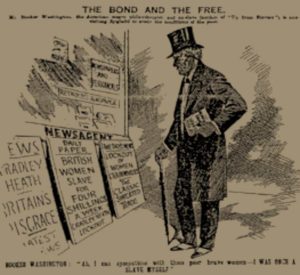
Brooker T.Washington cartoon
Mary Macarthur waged a stunning national campaign, which exposed the chainmasters as perpetuators of sweated labour, and which brought donations flooding in. As well as addressing meetings throughout the land, Macarthur proved an adept ‘spin mistress’, using the media to promote the women’s cause. She offered 79-year-old Patience Round for interview as the oldest woman on the strike, and she had an eye for a good photo as well. Mary would choose the oldest and frailest looking women and would have them drape their chains around their necks, a frequent image which appeared alongside headlines such as ‘Fetters of Fate’ and ‘Women Slaves of the Forge’.
She attracted the whole of the West Midlands’ Conservative press to the side of the women, while the strike was covered by many influential regional dailies in Sunderland, Manchester, Liverpool, Leeds, Sheffield, Nottingham, London, Brighton and elsewhere. Mary stimulated the interest of major national newspapers. The Times, whilst quick to point out that it did not often approve of strikes, made an exception in the case of the women chainmakers of Cradley Heath, for their ‘ill-clad, destitute appearance evoked universal sympathy’ (1 September 1910). The pro-Liberal Reynolds’s Newspaper recycled Robert Sherard’s phrase and described the women as ‘The White Slaves of England’.
On 10 September, the same paper published a cartoon depicting the freed American slave and founder of the first university for black students, Booker T. Washington, sympathising with the women because ‘I was once a slave myself’. Mr Washington was visiting England at the time. Nor was the media coverage confined to newsprint. The women’s ‘lockout’ was one of the first examples of industrial action to use the power of the new medium of film to promote its cause. In September a Pathé newsreel exposed the women’s working conditions and showed them marching through Cradley Heath singing songs of protest to the tunes of Yankee Doodle and the Men of Harlech – although there were only silent movies then! The film was shown at music halls in London, and at between 500 and 600 picture theatres around the country.
The grievances of the women chainmakers gained such notoriety that foreign social investigators flocked to this industrial plague spot. A German researcher, Herr Kummer, described Cradley Heath as ‘hell’. An Australian, Mr Bricknell, was amazed to find that the chainmakers were living in accommodation which, in his own country, people would not house their cattle in. When Will Anderson, chairman of the Independent Labour Party, attended an international conference in Copenhagen, he found the women chainmakers the centre of conversation.
Labour politicians took every opportunity to raise the issue at their meetings. At a meeting in Sheffield, Labour Party chairman and future government minister, Arthur Henderson voiced a desire to see all the pulpits of the country hung with chains made by sweated labour. Short of that, he expressed a wish that all chainmasters might be made to see their own wives put to chainmaking.
The strikers also found support amongst the business community, the aristocracy, and the clergy, including the Dean of Worcester, while Professor Walter Rauschenbusch, an exponent of Social Christianity, wrote a prayer for all women workers which was said for the women chainmakers in churches around the country.
Cradley Heath’s children entered into the spirit of the time. People stepping off the train were greeted with ‘Gimme a nod, missus.’ The children collected nods for good luck, marking a cross on a piece of paper for each nod. When they had a hundred, they buried the paper for two days, then dug it up, soaked it in a bucket of water for a day, and then burnt it at the forge, and while it was burning they made a wish. That wish, they said, was bound to come true. Perhaps they wished for more money in their mothers’ pockets.
◄ WINNING SUPPORT FOR CRADLEY HEATH’S WOMEN │ MARY REID MACARTHUR ►